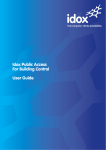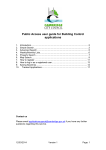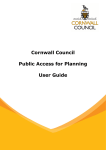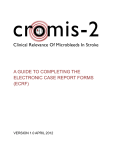Download Idox PA for Planning User Guide.book
Transcript
Idox Public Access For Planning User Guide Ideas, solutions, suggestions, hints and procedures from this document are the intellectual property of Idox Software Ltd and thus protected by copyright. They may not be reproduced, transmitted to third parties or used in any form for commercial purposes without the express permission of Idox Software Ltd. ID.310.1213 Idox PA for Planning User Guide December 2013 Contents Introduction User Details Registration . . . . . . . . . . . . . . . . . . . . . . . . . . . . . . . . . . . . . . . . . . . . . . . . . . . . . . . . . . . . 5 Log In . . . . . . . . . . . . . . . . . . . . . . . . . . . . . . . . . . . . . . . . . . . . . . . . . . . . . . . . . . . . . . . . 7 My Profile . . . . . . . . . . . . . . . . . . . . . . . . . . . . . . . . . . . . . . . . . . . . . . . . . . . . . . . . . . . . . 8 Searching Simple Search . . . . . . . . . . . . . . . . . . . . . . . . . . . . . . . . . . . . . . . . . . . . . . . . . . . . . . . . . 14 Advanced Search . . . . . . . . . . . . . . . . . . . . . . . . . . . . . . . . . . . . . . . . . . . . . . . . . . . . . . 15 Weekly/Monthly Lists Search . . . . . . . . . . . . . . . . . . . . . . . . . . . . . . . . . . . . . . . . . . . . . 17 Property Search . . . . . . . . . . . . . . . . . . . . . . . . . . . . . . . . . . . . . . . . . . . . . . . . . . . . . . . 18 Map Search . . . . . . . . . . . . . . . . . . . . . . . . . . . . . . . . . . . . . . . . . . . . . . . . . . . . . . . . . . . 20 Search Results Saving A Search . . . . . . . . . . . . . . . . . . . . . . . . . . . . . . . . . . . . . . . . . . . . . . . . . . . . . . . 28 Record Details . . . . . . . . . . . . . . . . . . . . . . . . . . . . . . . . . . . . . . . . . . . . . . . . . . . . . . . . . 28 Tracking Applications . . . . . . . . . . . . . . . . . . . . . . . . . . . . . . . . . . . . . . . . . . . . . . . . . . . 35 3 Introduction Introduction The Idox Public Access For Planning website has been designed to provide an efficient and easy-to-use process for members of the public to search for and track applications for planning permission, appeals against refused consent and planning enforcements. This document describes how to use the site. 4 User Details Registration User Details Anyone can use the Idox Public Access site but to take advantage of the advanced profile features you must first register a user account. Registration Registering for an Idox Public Access user account only requires you to provide your name and relevant contact details. 1 To create a new user account click on Register in the menu bar. 2 Register your personal details by filling in the following fields: • • • • • Title - select the title you wish to be addressed by. First Name - enter your first name. Surname - enter your surname. Email Address - enter your email address. Enter it again to confirm that it is correct. Password - enter a password that will allow only you to access your account. Note Passwords must be eight characters or longer, must contain a mixture of letters and numbers and must not contain spaces. Enter the password again below to confirm that it is correct. 3 Click on Next. 5 User Details Registration 4 Enter your postcode, the press Next. 5 Select your address from the drop down list, then click on Next. 6 If your address is not listed, select My address is not in the list and click on Next. 7 Enter your address details in the appropriate fields, then click on Next. 8 Click to read the Terms and Conditions and Privacy Policy that apply to the use of the site. When you have done so, tick the check box to indicate that you agree to them. 9 Check that your personal and login details are correct. To register them, click on the Next button. 10 An email will be sent to the address you entered. This provides final confirmation that you want to create an Idox Public Access account. When the email arrives, click on the link to be returned to the Idox Public Access site. 6 User Details Log In Log In In order to use the full range of features offered by Idox Public Access you need to log in to the site using the username and password you provided when you registered your account. 1 Click on Login in the menu bar. 2 Enter your email address and password, then click on the Login button. Forgotten password 1 If you forget your password, click on the Forgotten password? link. 2 Enter your email address and then enter a new password twice. Press the Change Password button. 3 A confirmation email will be sent to your email address. When it arrives, click on the confirmation link. You will now be able to log in with your new password. Log out When you are finished using Idox Public Access, remember to log out by clicking on the Logout button in the menu bar. 7 User Details My Profile My Profile Once your account has been created, you can access your My Profile area. This area allows you to configure your personal details as well as manage your searches and applications. • Profile Details - your full personal details • Saved Searches - a list of searches which you have saved • Notified Applications - notifications that applications that you are tracking, or are the subject of saved searches, have been modified • Tracked Applications - a list of applications that you have elected to track. Profile details The Profile Details pages allow you to view and update your account details. 1 Select Profile Details from the My Profile drop down list in the menu bar. The Personal Details page allows you to view the details you registered with. You can change any of those details or update your password. To update your password click on Change Password. Enter your email address and then enter a new password twice. Press the Change Password button. A confirmation email will be sent to your email address. When it arrives, click on the confirmation link. You will now be able to log in with your new password. To change your details click on Update Personal Details. Alter your details as required, clicking on the Next button to page through the sections. When you no longer wish to use Idox Public Access, click on Delete Profile. 2 3 4 5 6 8 User Details My Profile Saved searches The primary activity on the Idox Public Access site is to perform searches for information. Searches that will be performed frequently can be saved so that they may be repeated easily as often as you like (see “Searching” on page 13). Any changes to the status of applications previously found by your search criteria or any new applications which match the criteria of a saved search will trigger a notification. Notifications are listed in the Notified Applications page. 1 To view your saved searches, select Saved Searches from the My Profile drop down list. 2 You can sort the list by clicking on the appropriate column headings: • Search Title - sort the list alphabetically by search title • Search Type - sort the list alphabetically by search type. 3 To perform a saved search now, click on the Run button for that search. Note Circular map searches cannot be run from the Saved Searches page. 4 To modify the search criteria, click on the Edit button for that search. This returns you to the appropriate search form and allows you to change the details of the search. 5 To remove a search from the list, click on the Delete button for that search. 9 User Details My Profile Tracked applications After locating an application of interest by searching, you can choose to keep a watch on what happens to it by tracking it. Applications are displayed on the Tracked Applications page. When applications that you are tracking are modified a notification will appear on the Notified Applications page and you will be sent a notification email. 1 To view these applications, select Tracked Applications from the My Profile drop down list. 2 You can sort the list by clicking on the appropriate column headings: • Reference - sort the list alphanumerically by reference • Address - sort the list alphanumerically by the address that is the subject of the application • Type - sort the list alphabetically by the application type • Status - sort the list alphabetically by the status of the application. 3 To view a tracked application, click on the View button for that application. 4 To remove an application from the tracked applications list, click on the Stop Tracking button for that application. 10 User Details My Profile Notified applications When applications that are the subject of a saved search or are in your Tracked Applications list are modified, a list of those applications will appear in the Notified Applications page. You will also be sent a notification email. 1 To view your notifications, select Notified Applications from the My Profile drop down list. 2 The tracked applications that have been modified are listed at the top of the screen. These are followed by the modified applications that are subject to your saved searches. 3 To view an application, click on the View button for that application. 11 User Details My Profile 4 To remove an application from the notifications list, click on the Discard button for that application. To delete all of the notified results for a particular search, click on Discard All Results From This Search. 5 Additionally, you can select saved search applications from the notifications list and track these. Click on the Track icon for the applications of interest. These will now be added to your Tracked Applications page. 12 Searching Searching Your primary activity when you are logged in to the Idox Public Access site will be to search for planning records according to a variety of criteria. There are a variety of search methods to allow you to find the information you are looking for: • Simple - search quickly for applications, appeals or enforcements according to some entered text • Advanced - search according to a wide combination of relevant factors • Weekly/monthly list - search for applications whose status is validated or decided within a particular time period • Property - search for a particular property to which applications may apply • Map - search using an interactive map tool. 13 Searching Simple Search Simple Search A simple search allows you to search quickly for an application, appeal or enforcement by entering some text that will help identify it. 1 From the Search drop down list choose the Planning module, then select Simple Search. 2 In the Planning module you can search for: • Planning Applications • Planning Appeals • Enforcement notices. Click to select the type of record that you want to locate. 3 If you choose to search for Applications, you can also select the status of the records you are looking for: • Current applications • Decided applications • All applications. Choose the appropriate option from the Status drop down list. 4 Enter some text in the Search box that will correspond to one of: • reference number (for example, "2008/0125/DET") • post code (for example, "G1 3PL") • part of an address (for example, "Drymen", "Scott Street"). 5 Click on the Search button to display the results of your search (see “Search Results” on page 27). 14 Searching Advanced Search Advanced Search An advanced search allows you to build a complex combination of specific criteria on which to search for information. 1 From the Search drop down list choose the Planning module, then select Advanced Search. 2 In the Planning module you can search for: • Planning Applications • Planning Appeals • Enforcement Notices. Click to select the type of record that you want to locate. 3 A variety of reference numbers are associated with planning records. Enter one or more to help identify a specific record. 15 Searching Advanced Search 4 The details you can fill in depend on the record type selected. Record Type Details Required Application details Allows you to specify application type, application/appeal status or decision, and development type as well as location details, including ward, parish and address information. Appeal details Allows you to specify appeal type, status, decision or process as well as location details, including ward, parish and address information. Enforcement details Allows you to specify breach type and enforcement status as well as location details, including ward, parish and address information. Enter the details you want to search on. 5 Every planning case has a number of important dates associated with it (for example, the date the application was validated or the date that a court decision was issued). Use the date pickers to define an appropriate period to search within for any dates of interest. 6 Click on the Search button to display the results of your search (see “Search Results” on page 27). 16 Searching Weekly/Monthly Lists Search Weekly/Monthly Lists Search The weekly or monthly lists feature allows you to search for applications according to the week or month in which they were validated or decided, as published in the local authority’s lists. 1 From the Search drop down list choose the Planning module, then select Weekly/Monthly Lists. 2 Click on Weekly List or Monthly List to select which list you want to search. 3 You can narrow your search to a particular area by selecting from the Parish or Ward drop down lists. 4 Specify the Week or Month by selecting from the drop down list. 5 Under Show applications, select to display: • Validated applications • Decided applications. 6 Click on the Search button to display the results of your search (see “Search Results” on page 27). 17 Searching Property Search Property Search The property search feature allows you to search for a specific property in the gazeteer. There are two property search options: • Address - search for applications at a specified address • A to Z Street - search for applications on a specified street chosen from an alphabetical list. Address search 1 From the Search drop down list choose the Planning module, then select Property Search. 2 To search for a specific property by its address, select the Address Search tab. 3 Enter as many details as you know in the appropriate fields, then press the Search button to display the results of your search (see “Search Results” on page 27). 4 If you need to clear the fields and start again, press the Reset button. 18 Searching Property Search A to Z Street search 1 From the Search drop down list choose the Planning module, then select Property Search. 2 To search for a street alphabetically, select A to Z Street Search. 3 Click on the initial letter of the street you are interested in to display all the streets that begin with that letter. 4 Select a street from the list to display the addresses on that street, then choose an address to discover whether any planning records exist for that address. 5 To go back and chose a different street, click on the Refine Search button. 19 Searching Map Search Map Search Map search allows you to identify properties that are the subjects of applications, appeals or enforcements using an interactive map. The map allows you to zoom in and examine each property to locate the records of interest to you. You can filter the display by adding or removing record types and by changing the time period. Alternatively, if you are interested in applications relevant to a specific geographical area, such as close to your home, you can search for records limited either to the currently displayed map extent or to a specified radius from the map’s centre. These searches can be saved to your Saved Searches. 1 From the Search menu, choose the Planning module, then select Map Search. The initial view shows applications submitted within the last six months. 2 To zoom in on a specific location, click on a point on the map and click on the + button. To zoom out, click on the - button. Alternatively you can zoom in and out by scrolling the mouse wheel. Note The scale at the bottom left of the map changes as you zoom. 3 To pan the image around, click on the map and, keeping the mouse button depressed, drag in the direction you want to pan. 20 Searching Map Search 4 To refine the display, click on Enable Filter. 5 The initial view displays applications submitted within the last six months. To change the time period select from the Time Period drop down list. 6 To display more record types on the map, check the relevant boxes in the Legend and Filter list. To remove record types from the map, uncheck them. Most records can be displayed in two ways: • Records which only affect the property which is the subject of the application are shown as triangular points. • Records which affect others (for example, neighbours or the public) are displayed as a polygon which illustrates the boundary of the property affected by the application. 21 Searching Map Search Module Record type Planning Applications - properties for which planning applications have been submitted. Appeals - properties which are the subject of planning appeals. Enforcements - properties which are the subject of planning enforcements. Building Control Applications - properties for which building control applications have been submitted. Contraventions - properties which are the subject of building control contraventions. Building Standards Warrants - properties for which applications for building warrants have been submitted. Notices - properties which are the subject of building notices. Licensing Applications - properties for which licence applications have been submitted. Licences - properties which hold one or more licences. All 22 Properties - all valid properties in your local area. You can click on any of these to see if any current record (for example, application, or licence) exists at that address. Displayed As Searching Map Search 7 Once you have identified a record of interest, click on the triangle point or polygon to display a summary of the information about the record. If there is more than one record associated with the property, you can click on the navigation arrows to page through the record summaries. To view the full record details click on the Details link. 8 When the black Properties markers are displayed, you can click on any of these to view the property summary. To view full details about that property, including any historical records that do not fall into the time period displayed on the map, click on Property Details. 23 Searching Map Search Saving map searches You can add a map search to your Saved Searches list in one of two formats: • Rectangular search - saves all of the records of the selected record type that apply to the area currently shown on the map • Circular search - saves all of the records of the selected record type that apply to the area within a specified radius of the map centre. Note Map searches can only be saved for one record type (for example, applications) at a time. If you want to save a search for another record type in the same geographical area, you must save it as a different search. Rectangular search The rectangular search allows you to display occurrences of a record type over the geographical area currently displayed on the map. By re-running the search, you can monitor new occurrences. For example, if you have zoomed the map to display your town centre and filtered the legend to display planning applications in the last month you can save an extents search that allows you to monitor new applications arising in the town centre on a monthly basis. 1 2 3 4 Zoom and pan the map to display the geographical area of interest. Select the required time period. Filter the legend to display one record type. Click on Save a rectangular search. 24 Searching Map Search 5 On the Saved Search Options page you may change the default search title if you wish. 6 If you want to be notified by email of any new records matching your search criteria, select Yes. These notifications are displayed in your Notified Applications tab (see “Notified applications” on page 11). 7 Click Save to save the search to your list of Saved Searches (see “Saved searches” on page 9). Circular search The circular map search allows you to display occurrences of a record type over the geographical area currently displayed within a specified proximity of the centre of the map. By re-running the search, you can monitor new occurrences. For example, if you have zoomed the map to display your home and filtered the legend to display planning applications submitted in the last year you can save a proximity search that allows you to monitor new planning applications arising within a specified distance of your home on a yearly basis. 1 Zoom and pan the map, placing the geographical point of interest at the centre. 2 Select the required time period. 3 Filter the legend to display one record type. 25 Searching Map Search 4 Select the radial distance from the centre in which to search for records. Check the Show on map box to display the proximity as a circle around the centre. You can pan the map to make adjustments if required. 5 Click on Save a circular search. 6 In the Saved Search Options box you may change the default search title if you wish. 7 If you want to be notified by email of any new records matching your search criteria, select Yes. These notifications are displayed in your Notified Applications tab (see “Notified applications” on page 11). 8 Click Save to save the search to your list of Saved Searches (see “Saved searches” on page 9). 26 Search Results Search Results Once you have run a search, a list of records matching the search criteria is displayed. Note A speech bubble icon attached to a record indicates that comments may be made about that record at this time 1 You can manipulate how the search results are displayed to help you find applications of particular interest: • Sort By - re-order the results according to a selected criterion • Direction - choose whether the results are displayed in ascending or descending order • Results per page - choose how many results should be displayed on the page at once. 2 3 4 5 6 When you have made your display selections, click on the Go button. The number of results displayed (out of the total number of results) is shown. If there are more results than fit on to one page you can navigate between the results pages either by clicking on Next to view the next page or Previous to view the previous one, or by clicking directly on the page number A map of the relevant area is displayed. Click on Show results on Large map to see the locations of the search results in greater detail (see “Map Search” on page 20). If there are too many results, or if the results do not contain the applications you are looking for, you can go back and amend your search criteria. Press the Refine Search button. To display the current page of search results in a printable format, click on the Print button. Click on Print again in the new window to send the page to your local printer. Press Close when you are finished with this window. To view an individual record in detail, click on its title. 27 Search Results Saving A Search Saving A Search You may find that you use a particular search regularly. For example, a simple search based on your post code or an advanced search charting the progress of a specific planning application. As a registered users you can save these searches to be run again from your Saved Searches page (see “Saved searches” on page 9). Additionally, when new records corresponding to a saved search arrive, news of these will automatically appear on your Notified Applications page (see “Notified applications” on page 11). 1 To save a search, click on the Save Search button. 2 Change the default search title if you wish. 3 If you want to be notified by email of any new records matching your search criteria, select Yes. 4 Click on Save to save the search. Record Details When you select to view a record, the application details are displayed at the top of the page, with further tabs below containing all of the relevant information about the application. Planning records contain the following tabs: • Details - displays the key information about the record • Comments - displays any existing comments made about the case and allows registered users to contribute their own • • • • Constraints - lists any constraints placed on the case Documents - displays a list of documents relevant to the case Related Cases - displays a list of items which are related to the current record Map - displays the case property using the map view. 28 Search Results Record Details Details The Details tab displays key information about the record. 1 Click on the Details tab. 2 The record details are split up into four tabbed sections. Click on the appropriate tab to display those details. • Summary - displays the basic information pertaining to the record. The summary also identifies the number of the documents, cases and properties that have been added to this record. Click on one of these to view them. • Further Information - displays additional information about the application that was not included in the summary. • Contacts - displays a list of contacts relevant to this case. The number of contacts is displayed on the tab. • Important Dates - displays the dates on which important events in the life span of the case occur from initial submission through to the decision. If the case is still in progress some of these may be blank. 29 Search Results Record Details Comments The Comments tab displays any comments that have been made about this case by members of the public or members of official consultee groups. The number of comments is displayed on the tab. If the case is currently open for comments, registered users can add their own comment. 1 Click on the Comments tab. 2 To view comments made by members of the public, click on the Public Comments tab. 3 To see which consultee bodies have made comments on this case, click on the Consultee Comments tab. 4 You can re-order a comments list by the date the comment was added or by the commenter's name. Select one of these from the Sort by drop down list, then click on Go. 5 To change the direction of the list, select Ascending or Descending from the Direction drop down list, followed by Go. 6 To change the number of results displayed, select from the Results per page drop down list, followed by Go. 7 If there are more results than fit on one page, navigate by clicking on Next or Previous, or by clicking on the Page Number directly. 30 Search Results Record Details 8 Comments are displayed showing the name of the commenter and their stance on the case (objects, supports or neutral). The total numbers of these are displayed at the top of the list. Click on the commenter's name to display the comment itself. Click on it again to collapse the comment again. 9 Click on Expand All to view all of the comments on the page. Click on Collapse All to hide them all again. 10 To view all of the comments for a case as documents click on the View All Comments button. 11 If you are logged in you can add a comment about the case. Click on Make a Comment. 12 Your name and address are added automatically to the form. If these are not correct, click on update my personal details and make the appropriate changes. 13 Add your remaining contact details in the appropriate boxes. 14 The Commenter Type drop down list describes the type of people who may need to make a comment about a case. These include councillors, neighbours to the application address and members of the public. Select the one that applies to you. 31 Search Results Record Details 15 In the Reason for comment box select one or more of the offered reasons for making your comment. 16 Enter the details of your comment in the Your Comment box. 17 If you want to receive an email confirming that your comment has been received, check the Send me an email confirming my comments box. 18 When you have completed all the details, click on the Submit button. Your comment will appear in the Public Comments page for this case. Constraints 1 Click on the Constraints tab to display any constraints that have been placed on this application. The number of constraints are displayed on the tab. Documents 1 Click on the Documents tab to display any documents that have been added to this application. 2 If there are a lot of documents you can filter the list. Select one of the following from the Filter By list: • Document Type - select from the drop down list • Description - enter some text that may appear in a document’s description. Press Apply. 3 You can re-order the list according to: • Date Published • Document Type • Description. Click on the appropriate heading to re-order the list. 4 To view any of the documents in a separate window, click on View. 32 Search Results Record Details Related cases The Related Cases tab displays the other cases that have a relation to the current one. These may be other Applications, Appeals or Enforcements in the Planning module or cases in other Idox Public Access modules, if they are available. Affected properties are also listed in the Related Cases tab. The total number of items are displayed on the tab. 1 Click on Related Cases to view a summary of additional information related to the application. 2 To view any of the listed items, click on its title. 33 Search Results Record Details Map The Map tab displays the location of the case property on the interactive map. 1 Click on the Map tab. 2 The interactive map contains a number of tools to help you view the application area (see “Map Search” on page 20 for details). 34 Search Results Tracking Applications Tracking Applications Any application can be tracked so that you can keep up to date with its progress without having to search for it again. These cases are listed in your Tracked Applications page (see “Tracked applications” on page 10). 1 If you want to add a case to your Tracked Applications page click on the Track button. 2 To find this case again, select Tracked Applications under My Profile. 3 To stop tracking an application, return to the application details and click the Stop Tracking button at the top of the page. Alternatively click the Stop Tracking button next to the application in the Tracked Applications page. 35
















































